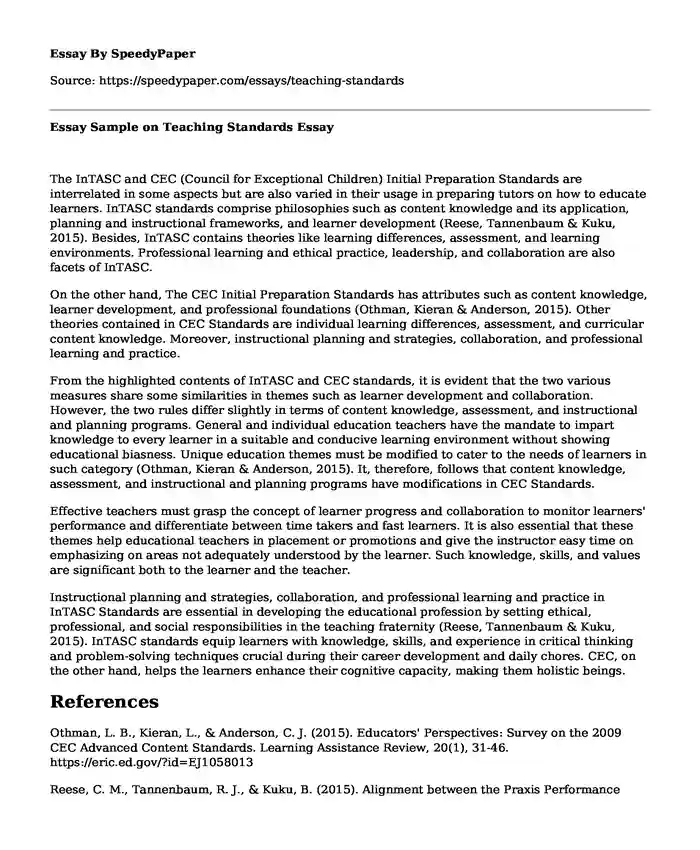The InTASC and CEC (Council for Exceptional Children) Initial Preparation Standards are interrelated in some aspects but are also varied in their usage in preparing tutors on how to educate learners. InTASC standards comprise philosophies such as content knowledge and its application, planning and instructional frameworks, and learner development (Reese, Tannenbaum & Kuku, 2015). Besides, InTASC contains theories like learning differences, assessment, and learning environments. Professional learning and ethical practice, leadership, and collaboration are also facets of InTASC.
On the other hand, The CEC Initial Preparation Standards has attributes such as content knowledge, learner development, and professional foundations (Othman, Kieran & Anderson, 2015). Other theories contained in CEC Standards are individual learning differences, assessment, and curricular content knowledge. Moreover, instructional planning and strategies, collaboration, and professional learning and practice.
From the highlighted contents of InTASC and CEC standards, it is evident that the two various measures share some similarities in themes such as learner development and collaboration. However, the two rules differ slightly in terms of content knowledge, assessment, and instructional and planning programs. General and individual education teachers have the mandate to impart knowledge to every learner in a suitable and conducive learning environment without showing educational biasness. Unique education themes must be modified to cater to the needs of learners in such category (Othman, Kieran & Anderson, 2015). It, therefore, follows that content knowledge, assessment, and instructional and planning programs have modifications in CEC Standards.
Effective teachers must grasp the concept of learner progress and collaboration to monitor learners' performance and differentiate between time takers and fast learners. It is also essential that these themes help educational teachers in placement or promotions and give the instructor easy time on emphasizing on areas not adequately understood by the learner. Such knowledge, skills, and values are significant both to the learner and the teacher.
Instructional planning and strategies, collaboration, and professional learning and practice in InTASC Standards are essential in developing the educational profession by setting ethical, professional, and social responsibilities in the teaching fraternity (Reese, Tannenbaum & Kuku, 2015). InTASC standards equip learners with knowledge, skills, and experience in critical thinking and problem-solving techniques crucial during their career development and daily chores. CEC, on the other hand, helps the learners enhance their cognitive capacity, making them holistic beings.
References
Othman, L. B., Kieran, L., & Anderson, C. J. (2015). Educators' Perspectives: Survey on the 2009 CEC Advanced Content Standards. Learning Assistance Review, 20(1), 31-46. https://eric.ed.gov/?id=EJ1058013
Reese, C. M., Tannenbaum, R. J., & Kuku, B. (2015). Alignment between the Praxis Performance Assessment for Teachers (PPAT) and the Interstate Teacher Assessment and Support Consortium (InTASC) Model Core Teaching Standards. https://www.ets.org/s/ppa/pdf/RM-15-10.pdf
Cite this page
Essay Sample on Teaching Standards. (2023, Mar 15). Retrieved from https://speedypaper.net/essays/teaching-standards
Request Removal
If you are the original author of this essay and no longer wish to have it published on the SpeedyPaper website, please click below to request its removal:
- Essay Sample: My Academic Problem and How I Deal with It
- Attending a Church Service, Essay Sample in Religion
- Essay Sample on Clinical Documentation System
- Essay Sample: Technical Process of Insurance
- Personal Identity and Values Essay Example
- Free Essay on Communication Theory and the Challenger Accident
- Free Essay Example - Princeton University
Popular categories





